What Are The Damages You Can Claim In The TikTok Mental Health Lawsuit?
- Last Updated: July 14th, 2025

Attorney Jessie Paluch, founder of TruLaw, has over 25 years of experience as a personal injury and mass tort attorney, and previously worked as an international tax attorney at Deloitte. Jessie collaborates with attorneys nationwide — enabling her to share reliable, up-to-date legal information with our readers.
Legally Reviewed
This article has been written and reviewed for legal accuracy and clarity by the team of writers and legal experts at TruLawsuit Info and is as accurate as possible. This content should not be taken as legal advice from an attorney. If you would like to learn more about our owner and experienced injury lawyer, Jessie Paluch, you can do so here.
Fact-Checked
TruLawsuit Info does everything possible to make sure the information in this article is up to date and accurate. If you need specific legal advice about your case, contact our team by using the chat on the bottom of this page. This article should not be taken as advice from an attorney.
Key Takeaways:
- Emotional distress damages include compensation for suffering, loss of enjoyment in life, emotional anguish, humiliation, or shame caused by harmful interactions on TikTok.
- Legal actions against ByteDance (TikTok's parent company) can be pursued if their app's content or algorithms contribute to users' mental health issues, like addiction and anxiety.
- File your lawsuit promptly due to statute limitations; gather evidence such as medical records and expert testimonies to support your claim.
Overview of the TikTok Mental Health Lawsuit
On this page, we’ll discuss an overview of the damages you can claim in the TikTok mental health lawsuit, allegations against other social media platforms, how to file a social media harm lawsuit, and much more.
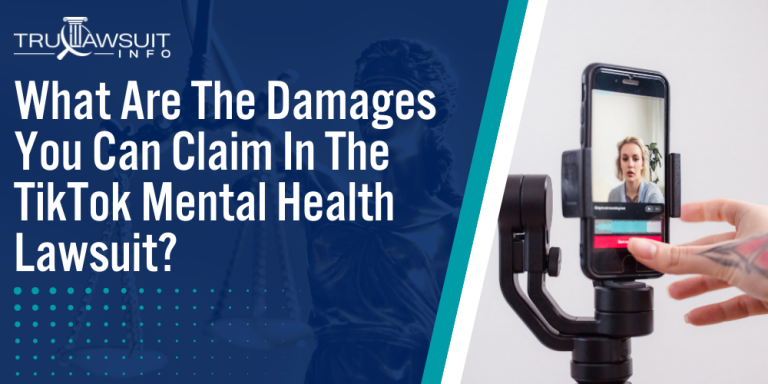
Intro to the TikTok Mental Health Lawsuit
The TikTok Mental Health Lawsuit has garnered significant attention due to its implications for social media platforms and their effect on users’ mental health.
The litigation addresses serious concerns about the potential negative impact of TikTok on young users, with claims relating to exposure to harmful content and the platform’s algorithm possibly intensifying those effects.
If you or a loved one has experienced negative mental health effects due to prolonged social media usage, you may qualify to file for compensation.
Contact TruLawsuit Info using the chat on this page to receive an instant case evaluation to discover if you are eligible to file in the TikTok lawsuit.
Table of Contents
Impact of TikTok on Youth Mental Health
Amidst an escalating youth mental health crisis, the role of TikTok and social media companies has come under intense scrutiny.
Studies on Mental Health Crisis
Research indicates a concerning correlation between social media consumption and the mental health of its users, particularly children and teenagers.
Noteworthy findings include:
- A study highlighted on CBS News reports that content promotion algorithms could pose risks to youth mental health.
- CNN presented information about how TikTok is one of several platforms being assessed by experts for its impact on teen mental health.
- World Health Organization data suggests that a significant percentage of adolescents grapple with mental health issues, which is a demographic actively engaged with TikTok, as shown on DBSAlliance.org.
Influence of Social Media Addiction
The addictive qualities of platforms like TikTok are often mentioned in discussions about social media addiction.
Key points regarding this dependency include:
- Algorithms designed to capture and retain attention can lead to excessive use, which in some cases has been linked to young people’s mental health problems.
- Legal actions, as reported on CBS News, have been initiated with claims that excessive screen time and social media interaction through TikTok contribute to the mental health crisis.
- Efforts by school districts and government officials, such as the litigation mentioned on NYC.gov, to address these issues indicate the severity and urgency of the situation.
Allegations Against Other Social Media Platforms
The TikTok Mental Health Lawsuit focuses on claims that social media platforms have not only neglected the wellbeing of their youngest users but have directly contributed to the worsening of their mental health.
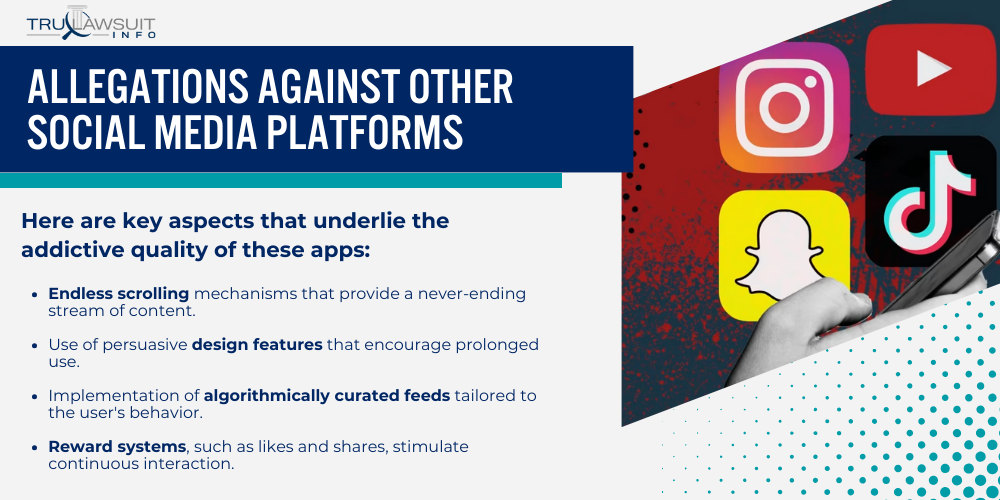
Claims of Encouraging Addictive Behavior
New York City’s lawsuit alleges that these platforms have developed features that are inherently addictive in nature, capitalizing on the psychology of young users to keep them engaged.
Here are key aspects that underlie the addictive quality of these apps:
- Endless scrolling mechanisms that provide a never-ending stream of content.
- Use of persuasive design features that encourage prolonged use.
- Implementation of algorithmically curated feeds tailored to the user’s behavior.
- Reward systems, such as likes and shares, stimulate continuous interaction.
Failures in Protecting Young Users
The protection of children online should be paramount, yet the lawsuit suggests that the implicated social media platforms have failed to create age-appropriate experiences.
The evidence presented highlights several areas of concern:
- Insufficient parental controls to monitor and limit use.
- The presence of harmful content that minors can easily access.
- A lack of robust age-restricted features to keep adult content from young users.
- The alarming rise in mental health issues attributed to social media use without an adequate response from the platforms.
Reactions and Responses to the TikTok Mental Health Lawsuit
In the wake of the TikTok Mental Health Lawsuit, various stakeholders, including industry officials, experts, community members, and parents, have surfaced with various reactions and responses.
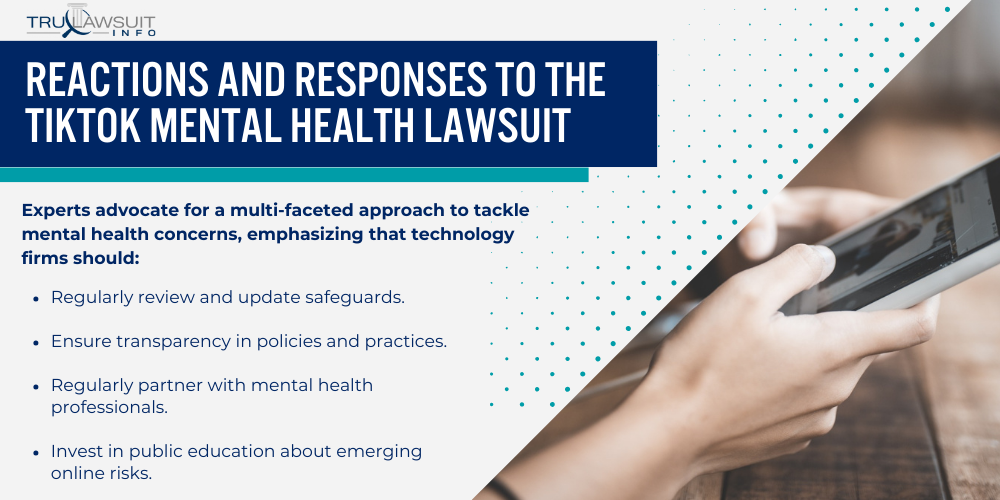
Industry and Expert Opinions
Industry leaders have been critical yet constructive regarding the lawsuit’s implications, calling attention to the industry-wide challenges and the continuous evolution of industry-leading safeguards.
Opinions from professionals detail the complexity of online interactions and the rate at which emerging best practices are being identified and implemented.
Experts advocate for a multi-faceted approach to tackle mental health concerns, emphasizing that technology firms should:
- Regularly review and update safeguards.
- Ensure transparency in policies and practices.
- Regularly partner with mental health professionals.
- Invest in public education about emerging online risks.
Parenting experts recommend that social media companies collaborate more directly with mental health professionals to enhance their understanding and management of potential harms associated with platform use.
Community and Parental Feedback
Responses from the community and parents have been diverse, reflecting a range of perspectives on the roles and responsibilities of traditional social media companies in safeguarding the mental health of young users.
Community members emphasize the need for increased accountability, insisting that companies:
- Engage in more proactive monitoring.
- Provide accessible mental health resources.
- Develop more stringent age-appropriate experiences online through verification processes.
- Facilitate parental controls that are both effective and user-friendly.
In a news conference, Mayor Eric Adams highlighted New York City’s dedication to addressing the mental health crisis. They called on social media companies to bear responsibility for their impact on youth well-being.
Parents, on the whole, seek assurances that platforms like TikTok are taking the issue seriously and earnestly protecting young users.
New York City's Strategies and Measures
In a decisive response to the rising concern regarding youth mental health, New York City has implemented strategic measures to tackle the issue head-on.
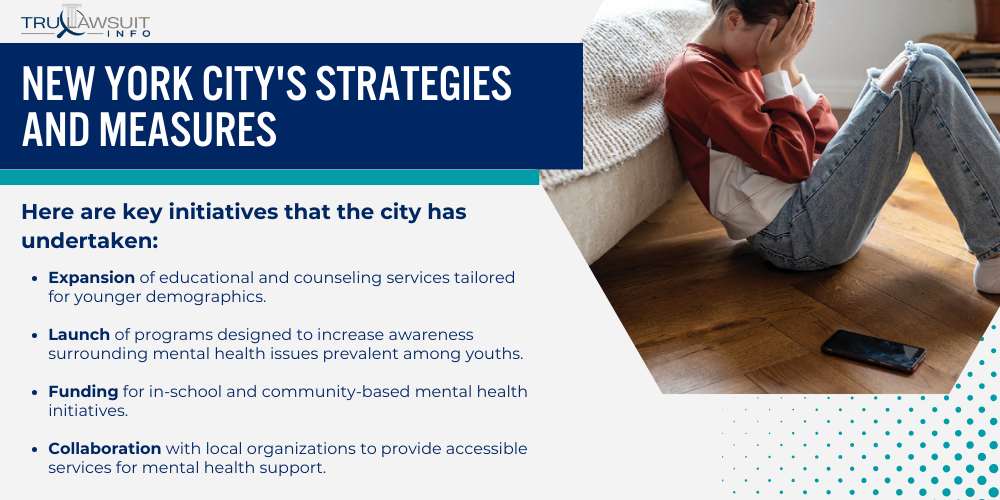
The city’s approach includes both preventive and reactive strategies to address the negative impacts associated with social media platforms.
Investment in Youth Mental Health Programs
New York City recognizes the importance of supportive infrastructure in the holistic development of its young population.
Officials said the city spends about $100 million annually on youth mental health programs.
Here are key initiatives that the city has undertaken:
- Expansion of educational and counseling services tailored for younger demographics.
- Launch of programs designed to increase awareness surrounding mental health issues prevalent among youths.
- Funding for in-school and community-based mental health initiatives.
- Collaboration with local organizations to provide accessible services for mental health support.
These commitments reflect the city’s proactive stance in ensuring youth receive adequate mental health programs and resources.
Holding Tech Companies Accountable
The city has openly confronted the role big tech companies play in affecting the mental well-being of its younger residents.
New York City’s steps to hold these corporations accountable include:
- Filing lawsuits against companies accountable for their role in creating increased screen time and addiction amongst youth.
- More rigorous age-verification processes and parental controls are being demanded to safeguard minors.
- Calling for greater transparency in how algorithms targeting children are designed and the effects they may have.
- Advocating for policy changes would lead to healthier digital spaces for young users.
Response from Tech Companies: TikTok Mental Health Lawsuit
In the unfolding narrative of the TikTok mental health lawsuit, tech companies have voiced their perspectives and underscored their ongoing efforts to support user well-being.
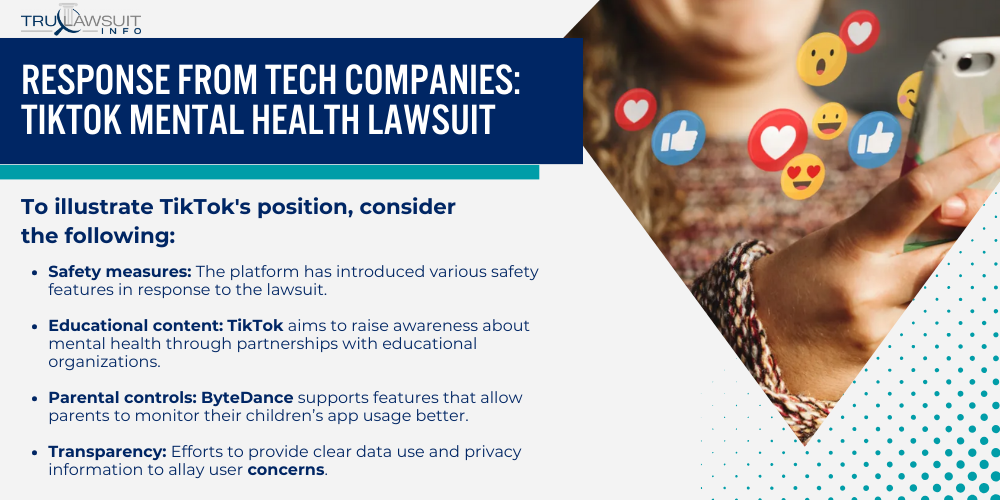
Big Tech’s Perspective
Big Tech companies, including TikTok’s parent company ByteDance, offer a unique defense regarding the impact of their platforms on users’ mental health.
They posit that while privacy concerns and the well-being of teens in an online world are paramount, they have diligently worked to create a safe digital environment.
For example, TikTok states that the platform is intentionally designed to include safety features that protect high school students and other young users.
To illustrate TikTok’s position, consider the following:
- Safety measures: The platform has introduced various safety features in response to the lawsuit.
- Educational content: TikTok aims to raise awareness about mental health through partnerships with educational organizations.
- Parental controls: ByteDance supports features that allow parents to monitor their children’s app usage better.
- Transparency: Efforts to provide clear data use and privacy information to allay user concerns.
Efforts to Combat Mental Health Issues
In response to the lawsuit and action plan, involved tech companies have stepped up their game with robust measures focused on combating mental health issues.
They emphasize their contribution to safeguarding the mental well-being of their users, especially vulnerable high school students.
Following are some of the steps taken by these companies:
- Content moderation: Enhancing efforts to monitor and remove harmful content from the major social media platforms.
- User resources: Providing access to mental health resources and support services.
- Algorithm adjustments: Making changes to algorithms to reduce the spread of content that could negatively affect mental health.
- Collaborations: Working with mental health experts to improve app design and user experience.
The role Snapchat plays as part of this broader tech community is not to be underestimated.
They are also under scrutiny and actively participating in the conversation about supporting teens’ well-being in the dynamic social media landscape.
Future Implications of the TikTok Mental Health Lawsuit
The TikTok Mental Health Lawsuit is poised to set a precedent for how social media platforms are held accountable for mental health issues.
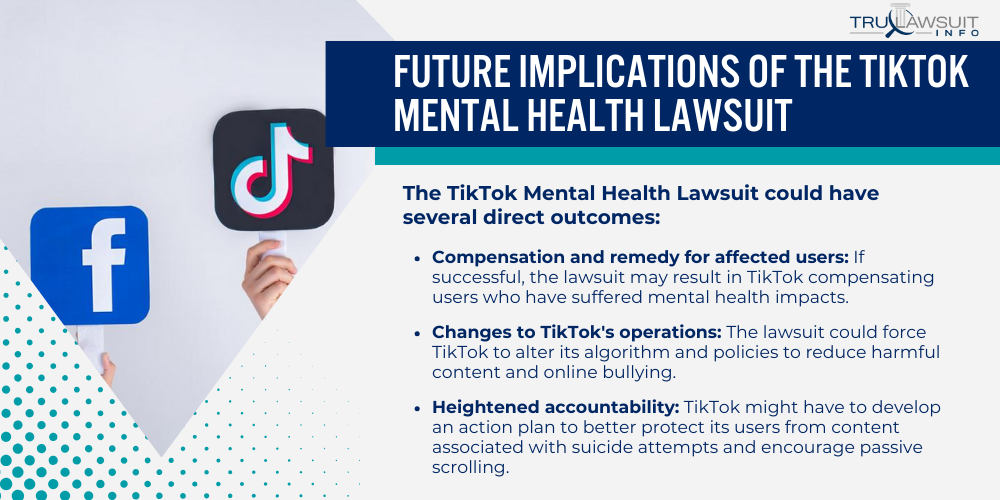
This will bring attention to user safety and potentially reshape social media regulation.
Expected Outcomes of the Lawsuit
The resolution of this lawsuit may mark a pivotal moment in the way digital platforms are required to engage with the mental health of their users.
Highlighting the tangible impacts of online environments could prompt a shift towards more responsible content curation and user interaction.
The TikTok Mental Health Lawsuit could have several direct outcomes:
- Compensation and remedy for affected users: If successful, the lawsuit may result in TikTok compensating users who have suffered mental health impacts.
- Changes to TikTok’s operations: The lawsuit could force TikTok to alter its algorithm and policies to reduce harmful content and online bullying.
- Heightened accountability: TikTok might have to develop an action plan to better protect its users from content associated with suicide attempts and encourage passive scrolling.
- Public health support: The suit may lead to financial contributions to the public hospital system for handling mental health cases related to social media use.
Wider Implications for Social Media Regulation
The ramifications of this legal action could extend well beyond the confines of TikTok, setting a new benchmark for how all social media platforms manage and mitigate risks to mental health.
Such a development would underscore the urgent need for comprehensive strategies to ensure the digital well-being of users worldwide.
The lawsuit may have broader effects beyond just TikTok itself:
- A model for similar legal actions: This legal case could provide a template for tackling industry-wide challenges on other platforms like Snapchat and YouTube.
- Influence on policy and regulation: The legal discourse around the lawsuit may inform future policies aimed at protecting social media users’ usual activities and well-being.
- Corporate responsibility and transparency: Social media companies might become more transparent about their products‘ effects on mental health and take greater responsibility.
- A contribution to a larger reckoning within the tech industry: It could lead to a wider examination of tech practices and potentially influence legal action in New York City and other municipalities.
Additional Considerations in the TikTok Mental Health Lawsuit
In assessing the TikTok Mental Health Lawsuit, several specific factors come into focus.
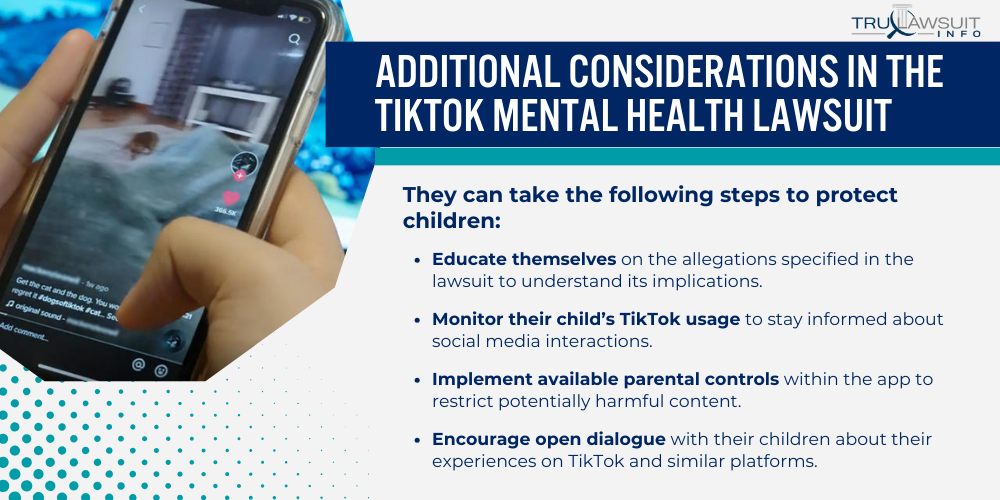
These include the guidance necessary for parents to navigate the legal landscape and the educational components essential in addressing mental health concerns related to social media usage.
Guidance for Parents in the TikTok Mental Health Lawsuit
Parents seek clarity on how to support teens’ well-being through the turbulence of the TikTok mental health case.
Parental controls and strategies for creating a safe environment online are pivotal.
They can take the following steps to protect children:
- Educate themselves on the allegations specified in the lawsuit to understand its implications.
- Monitor their child’s TikTok usage to stay informed about social media interactions.
- Implement available parental controls within the app to restrict potentially harmful content.
- Encourage open dialogue with their children about their experiences on TikTok and similar platforms.
Role of Education in Addressing Mental Health
The role of education cannot be understated when it comes to maintaining a community safe from the detrimental effects of passive scrolling and exposure to the dark corners of social media.
The landscape has presented many challenges in the past decade, and education has spent a decade working to keep up.
Schools, community groups, and online resources provide crucial support:
- Integrate mental health topics into curriculums to help teens recognize and articulate their experiences.
- Create supportive networks, offering programs where teens can connect with close friends and trusted adults in a controlled environment.
- Foster digital literacy and critical thinking to help teens assess online content.
- Partner with experts from places like New York City who have been at the forefront of addressing the role Snapchat plays and other similar allegations.
Frequently Asked Questions
-
What legal actions are being taken against TikTok regarding mental health issues?
Several lawsuits have emerged accusing TikTok of causing mental health issues among users.
One significant legal action is the TikTok Mental Health Lawsuit, where parents have filed claims on behalf of their children who suffered from the negative consequences of TikTok use.
-
How is TikTok's content moderation affecting user mental health?
TikTok’s content moderation has been a concern regarding user mental health.
There are reports that the platform’s heavy reliance on visual content and inadequate filtering contributes to the proliferation of harmful images and messages, which can negatively impact the mental and emotional health of young people.
-
Can an individual file a lawsuit against TikTok for mental health damages?
Yes, an individual who believes they have experienced mental health damages due to TikTok’s platform can seek legal representation to file a lawsuit.
Legal consultation can confirm the availability of such an action, as seen with TruLaw, which offers an option for individuals to find out if they qualify for the TikTok Mental Health Lawsuit.
-
What are the core arguments in the mental health lawsuit against TikTok?
The core arguments in the mental health lawsuit against TikTok generally revolve around the platform’s design features and algorithms, which are said to promote an addictive nature and exposure to harmful content.
Plaintiffs claim that such exposure leads to emotional and psychological harm, particularly in young and impressionable users.
-
How is TikTok responding to claims of mental health harm caused by its platform?
TikTok’s response to the claims of mental health harm has involved implementing additional safety and content moderation features.
Additionally, TikTok has made statements regarding its commitment to the well-being of its users and the continued development of protective measures against content that could cause mental health issues.

Experienced Attorney & Legal SaaS CEO
With over 25 years of legal experience, Jessie is an Illinois lawyer, a CPA, and a mother of three. She spent the first decade of her career working as an international tax attorney at Deloitte.
In 2009, Jessie co-founded her own law firm with her husband – which has scaled to over 30 employees since its conception.
In 2016, Jessie founded TruLaw, which allows her to collaborate with attorneys and legal experts across the United States on a daily basis. This hypervaluable network of experts is what enables her to share reliable legal information with her readers!
Have A Case?
Here, at Tru Lawsuit Info, we’re committed to helping victims get the justice they deserve.
To do this, we actively work to connect them with attorneys who are experts in litigating cases similar to theirs.
Would you like our help?
Tru Lawsuit Info is a reliable source of information about issues that may affect your health and safety, such as faulty products, data breaches, and environmental hazards.
Our team of experienced writers collaborates with medical professionals, lawyers, and advocates to produce informative articles, guides, and other resources that raise awareness of these topics.
Our thorough research provides consumers with access to reliable information and updates on lawsuits happening around the country. We also can connect consumers with attorneys if they need assistance.
Camp Lejeune's water contamination issue spanned several decades starting in the 1950s. Exposure to these chemicals has been linked to various serious health issues, including cancer, organ diseases, and death.
Research is increasingly suggesting a link between the use of Tylenol during pregnancy and the development of neurodevelopmental disorders, such as autism and ADHD, in infants.
Legal action is being taken against manufacturers of Aqueous Film-Forming Foam (AFFF), a chemical used in fighting fires. The plaintiffs allege that exposure to the foam caused health issues such as cancer, organ damage, and birth and fertility issues.
Have A Case?
Here, at Tru Lawsuit Info, we’re committed to helping victims get the justice they deserve.
To do this, we actively work to connect them with attorneys who are experts in litigating cases similar to theirs.
Would you like our help?







